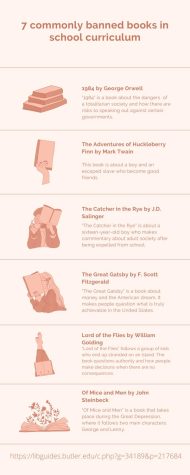Two weeks ago, Librarian Carissa McDonald sent out an email to all teachers pertaining to new policies for parents being allowed to ban books and mediums. So what has changed?
 The procedure creates more regulations on parents being able to challenge books or mediums that are offensive and do not pose any educational value to what the children are learning. According to the legislation, all instructional materials being taught to students are able to be challenged by parents. There is also a set of guidelines pertaining to religion, ideology, race, gender, age and controversial issues in order to make sure teachers are presenting educational material in an unbiased way.
The procedure creates more regulations on parents being able to challenge books or mediums that are offensive and do not pose any educational value to what the children are learning. According to the legislation, all instructional materials being taught to students are able to be challenged by parents. There is also a set of guidelines pertaining to religion, ideology, race, gender, age and controversial issues in order to make sure teachers are presenting educational material in an unbiased way.
The new regulation requires a parent to fill out a “Reconsideration of Instruction Form” on which they state their problems with the medium. Some of the questions include why the parent chose to challenge the medium and whether the book has any instructional value.
Principal Darren Erickson states that this is not his first time changing regulations. “Policies over stuff like this have been around forever, even back to when I was a teacher in 2003,” he said. In 2003, a book called “The Misfits” written by James Howe was challenged because one of the characters in the book openly stated that he was gay.
Parents believed it was unnecessary to have a gay child in a book for children in grades K-6. The proposal was shot down by the department of education because there was still educational value to book.
And such challenges happened last year, too.
The American Literature course’s content came into question during the 2020-2021 school year when a political cartoon was challenged due to its racial connotation. One cartoon in particular was depicting the American Dream, where there was a path for white people that was straight and a path below that depicted the path of an African-American that was windy and labeled with different periods of time within each curve of the path.
The path was labeled words such as “slavery” and “Jim Crow laws”, and the political cartoon claimed that African-Americans have had a rougher path towards the American Dream but are still able to achieve the American Dream today regardless of race. The political cartoon was aimed to make students think critically about the American Dream, yet some members of the community believed that the cartoon was implying that Black citizens are still having a harder time achieving the American Dream than white citizens.
This led those community members to believe the cartoon was inherently racist, however the goal of the lesson involving the cartoon was to acknowledge Black struggles in America. When it comes to racial topics, teachers are able to present information in a non-biased manner in order for the students to react and learn from the medium, leading faculty to believe the lesson was acceptable. The request was shut down by the department of education later that year.
“There is a fine line between teaching things in a way to make students think objectively and teaching things in a way that forces students to have a certain opinion,” Erickson said. “No teacher should say ‘you should think this’, or ‘you should think that.’ When teaching about controversial books and mediums, teachers are able to make their students think critically over controversial topics in order to develop their own ideas.”
The new regulation requires a parent to fill out a “Reconsideration of Instruction Form” where they state their problems with the medium. Some of the questions include why the parent chose to challenge the medium, and also whether the book has any instructional value.
Senior Kris Basnet believes that controversial books should be taught in schools. “I think that books should not be limited to the classroom. Books are written to spread awareness and spark creativity. Banning books would only limit the expressive creativity that our brain has to offer,” he said.
New policies do not mean that parents will stop challenging books and mediums, nor will this be the last time that policies will be changed. Education is a living and breathing subject that changes on a daily basis. No decision is going to make everyone satisfied, but that does not mean that people should stay silent about their opinion.









